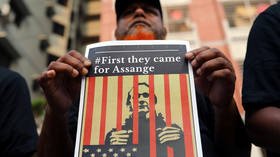Iceland court orders Visa & Mastercard partner Valitor to pay $10mn over WikiLeaks banking block

Valitor, a partner of Visa and Mastercard, must pay WikiLeaks US$10 million for refusing to lift its 2011 banking blockade against the whistleblowing site despite a court order, local media reports.
The District Court of Reykjavik is ordering Valitor to fork over some $10 million (1.2 billion Icelandic krona) to WikiLeaks payment processor DataCell and WikiLeaks publisher Sunshine Press after Valitor failed to comply with a 2013 Supreme Court order to resume processing credit card payments for WikiLeaks.
Valitor was warned when the ruling came down that if they did not lift the blockade, daily penalties would continue to pile up. It is reported that Valitor plans to appeal.
Icelandic court has ordered formerly VISA Iceland (now VALITOR @ValitorPayments) to pay $10m (1.2 bn ISK) in damages for blocking credit card donations to WikiLeaks in 2011. Valitor has stated it is likely to appeal (Valitor is a subsidiary of @arionbanki) pic.twitter.com/7lRsC900Wz
— WikiLeaks (@wikileaks) April 24, 2019
Iceland’s Supreme Court ruled almost six years ago that Valitor had acted unlawfully in terminating its contract with DataCell.
The website sued Valitor in June 2012 over the “extrajudicial” banking blockade, which it said was done “without democratic oversight or transparency.”
Also on rt.com UN Special Rapporteur meets Assange in ‘British Gitmo’ jail to discuss breach of privacy claimsIn 2010, Bank of America, VISA, Western Union, PayPal, and Mastercard jointly imposed a ban on donations to the publisher less than two weeks after it posted the Cablegate leaks, a damning trove of diplomatic cables that exposed the inner workings of governments around the world.
WikiLeaks founder Julian Assange was arrested earlier this month after Ecuador revoked his asylum claim and evicted him from its London embassy, where he had been living for seven years. He could be extradited to the US, where he faces charges of conspiring to unlawfully access the Pentagon’s computer network.
Think your friends would be interested? Share this story!












